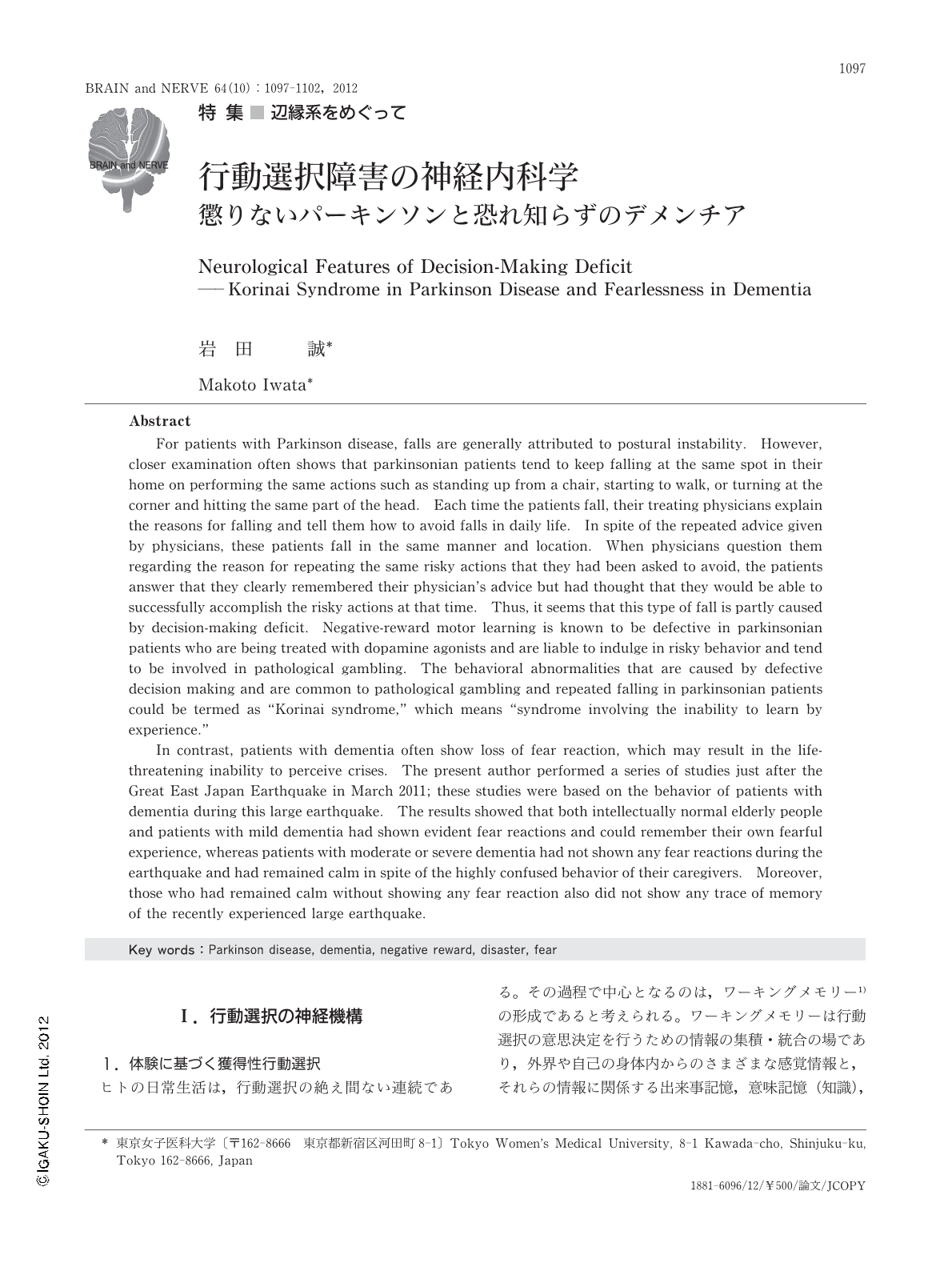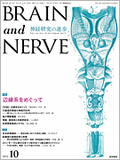Japanese
English
- 有料閲覧
- Abstract 文献概要
- 1ページ目 Look Inside
- 参考文献 Reference
Ⅰ.行動選択の神経機構
1.体験に基づく獲得性行動選択
ヒトの日常生活は,行動選択の絶え間ない連続である。その過程で中心となるのは,ワーキングメモリー1)の形成であると考えられる。ワーキングメモリーは行動選択の意思決定を行うための情報の集積・統合の場であり,外界や自己の身体内からのさまざまな感覚情報と,それらの情報に関係する出来事記憶,意味記憶(知識),そしてこれらを操作する手続き記憶(技)などの情報が一堂に集められ2),その形成部位は前頭前野であろうと考えられている。前頭前野は,これらのさまざまな情報に基づいて行動選択の意思決定を行っていると考えられているが,その中で大きな意義を持っているのは,成功体験,あるいは失敗体験といった出来事記憶の存在である。
齋藤3)は,10歳頃までの思い出を自由想起させ,想起された思い出のそれぞれに,「快」「不快」「どちらともいえない」の3段階評価を行わせると,一般の人の場合,その比率は大体6:3:1になると述べ,この比率を思い出の中の感情比率と呼んでいる。すなわち,自由想起される出来事記憶のうち約30%は,「不快」な記憶であるが,このようなマイナスの記憶が常にほぼ一定の割合で存在していることは,日々の行動選択において大きな意義を有すると考えられる。
Abstract
For patients with Parkinson disease, falls are generally attributed to postural instability. However, closer examination often shows that parkinsonian patients tend to keep falling at the same spot in their home on performing the same actions such as standing up from a chair, starting to walk, or turning at the corner and hitting the same part of the head. Each time the patients fall, their treating physicians explain the reasons for falling and tell them how to avoid falls in daily life. In spite of the repeated advice given by physicians, these patients fall in the same manner and location. When physicians question them regarding the reason for repeating the same risky actions that they had been asked to avoid, the patients answer that they clearly remembered their physician's advice but had thought that they would be able to successfully accomplish the risky actions at that time. Thus, it seems that this type of fall is partly caused by decision-making deficit. Negative-reward motor learning is known to be defective in parkinsonian patients who are being treated with dopamine agonists and are liable to indulge in risky behavior and tend to be involved in pathological gambling. The behavioral abnormalities that are caused by defective decision making and are common to pathological gambling and repeated falling in parkinsonian patients could be termed as "Korinai syndrome," which means "syndrome involving the inability to learn by experience."
In contrast, patients with dementia often show loss of fear reaction, which may result in the life-threatening inability to perceive crises. The present author performed a series of studies just after the Great East Japan Earthquake in March 2011; these studies were based on the behavior of patients with dementia during this large earthquake. The results showed that both intellectually normal elderly people and patients with mild dementia had shown evident fear reactions and could remember their own fearful experience, whereas patients with moderate or severe dementia had not shown any fear reactions during the earthquake and had remained calm in spite of the highly confused behavior of their caregivers. Moreover, those who had remained calm without showing any fear reaction also did not show any trace of memory of the recently experienced large earthquake.

Copyright © 2012, Igaku-Shoin Ltd. All rights reserved.


